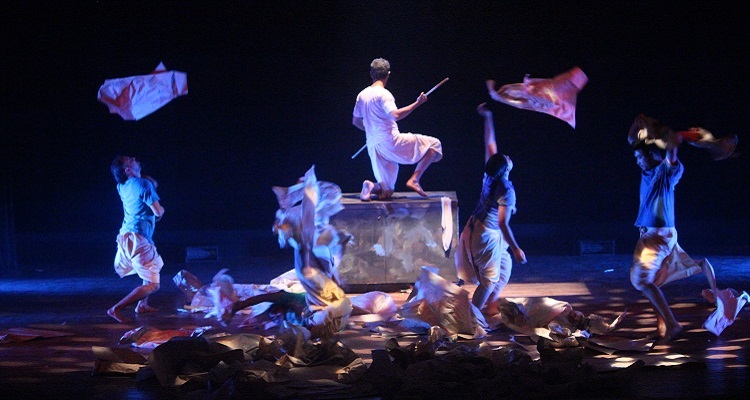The Old Man
Vodai’s fate seems to be submerged under a cruel aquatic plot. It has been 83 days since Vodai, the old man, has caught hold of a fish. And thus, for 83 days that now feel like 83 years, he has been restless. The river constantly tests his patience and brings to his net no fishes. His defeat has now become a subject of mockery, the villagers believe that even his company is cursed - some warn against going fishing with him, for anybody who does, they too will end up with no fish in their fortune! And yet, Vodai does not pay heed to what others have to say and feels incomplete even if a day goes by without him meeting the river, it has become a tradition and he is on a mission, a quest to know the river better.
And it was this turbulent quest that Vodai had embarked upon that kept the audience at the edge of their seats. Showcased as a part of the 17th edition of Mahindra Excellence in Theatre Awards, The Old Man is an exceptional tale. An Assamese adaptation of a Hemingway classic, The Old Man and The Sea, this play was visually rich, aesthetically captivating and lyrically beautiful.
The story focused on Vodai, an old man who has trust in his own strength and believes that against all odds, his net shall be awarded with a big fish. He trusts the river, has faith that one day, the river will save him from the mockery of those who disbelieve him. The river is harsh, it challenges his courage and yet he expresses: “It holds a special place in my heart!”. He harks back to his past, evoking the memory of a time when he could catch fishes that weighed more than 80 kgs. Maybe the river isn’t a foe, it does not betray anyone, the old man tells a young man, Rongmon, who wants to learn fishing from him.
What truly left an impact on me was the beauty with which the relationship between Vodai and Rongmon was portrayed on the stage. It did not only show the equation of a mentor and a mentee but also of an avid storyteller and an excited listener. With a remarkable use of props and lighting, the audience was enthralled everytime Vodai would begin narrating tales from his childhood. For those moments when Rongmon was present, it felt as if Vodai was more hopeful than before - he was heartened, there was somebody who trusted him to teach a craft that he was losing hold of.
But this delicate tie was soon broken due to the intervention of Rongmon’s father, who desired for his son to learn fishing from a younger man, Hirendra. After all, it was the young men with the power to catch a big fish! The valour of the younger lot was such that the old man’s historical tales sounded like fantasy. Sometimes, Vodai wondered if the fish also knew that he had become old. But despite it all, he continued to voice his love for the river: “my whole world revolves around it!”.
It was at the end of the play that we witnessed one of the most thrilling scenes. Once more, with a splendid use of props, an astoundingly dramatic sequence was created in which Vodai was on the verge of being successful and capturing a fish that floated on a stage that was covered with smoke and fog. And the moment we think he has finally won and is about to bring an end to this curse, nature intervenes and yet again, he becomes the old man with no fishes!
As this story evolved on the stage, I began to feel that Vodai had forged a relationship with the river that almost resembles the bonds that we form with difficult family members. There are many with whom our opinions clash and ideas don’t match and yet, for some relationships, we continue to hold onto something and are against letting them go. Vodai’s adoration for the river felt quite similar, the equation was demanding and challenging and yet, the quest carried on and songs continued to be sung: “Whosoever is a child of the river, lives on hope and doesn’t die easily!”




Leave a reply